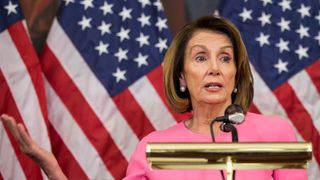In the end, the verdict of the American voter in the US mid-term elections was neither a blue wave nor a red wave: more of a restless wave.
As anticipated, the Republicans appear to have maintained effective control of the Senate while the Democrats have recovered the House of Representatives.
This means the next two years of Donald Trump’s administration will be harder going for the White House, especially if Nancy Pelosi (Democrat, California) returns to the speakership. Though there is some doubt about whether the house Democratic caucus will renew Pelosi as Speaker, there is no doubt that the departure of Speaker Paul Ryan (Republican, Wisconsin) with his house majority represents a serious obstacle for Trump.
While rarely acknowledging the significance of Republican majorities in both houses from November 2016 until yesterday, Trump was the principal beneficiary of the majority leadership of senator Mitch McConnell (Republican, Kentucky) and Speaker Ryan. They delivered Trump the votes for his tax cuts and for Supreme Court nominees, central pillars of Trump’s political achievement.
The fact that the primary Democratic campaigners were former president Barack Obama and his vice-president, Joe Biden, merely underlines the salient reality that the Democrats have not yet renewed themselves in the aftermath of Hillary Clinton’s defeat. No Democrat is a frontrunner for 2020.
It is possible that the next two years of American government will be characterised by gridlock, although Pelosi has already suggested that it may be possible for the new house to co-operate with the administration on an infrastructure bill or on reducing the costs of prescription drugs.
An infrastructure bill is utterly critical to Trump’s hopes for re-election in 2020, should he run.
On the Democratic side of the aisle, there are important lessons to be drawn from these mid-term polls.
The fact that the primary Democratic campaigners were former president Barack Obama and his vice-president, Joe Biden, merely underlines the salient reality that the Democrats have not yet renewed themselves in the aftermath of Hillary Clinton’s defeat. No Democrat is a frontrunner for 2020.
Put simply, the leadership of the Democratic Party is ageing to the point where generational change is needed urgently.
Pelosi is 78 and her colleague Steny Hoyer (Maryland) is 79. Senate minority leader Chuck Schumer (New York) is 67. Senator Dianne Feinstein (California) is 85 and will be 92 if she elects to retire at the conclusion of her term. For a party that aims to represent American youth, this ageing leadership highlights a certain incongruity, to say the least.
For the Republicans, there will now be a careful assessment of the party’s future under Trump. Trump himself was the issue for many voters and it is utterly fascinating to read interviews with Republican voters. Almost inevitably, intending Republican voters qualified their support for the President with a caveat that they did not endorse the language of his tweets or his abuse of opponents and critics.
Holding the Senate was a real achievement for the Republicans and Trump must be given credit for mobilising his base. But the Democrats were defending too many vulnerable seats in red states for there to be much realistic hope of winning control.
Holding the Senate was a real achievement for the Republicans and Trump must be given credit for mobilising his base. But the Democrats were defending too many vulnerable seats in red states for there to be much realistic hope of winning control. In fact, Democratic aspirations to impeach Trump — largely delusional and often diverting — may recede into the background.
This is a dead-end.
Special Counsel Robert Mueller’s report still looms large and Democratic control of house committees in the foreign policy, intelligence and judicial arenas will gift the party more opportunity to probe the White House.
There were significant political shifts in the US before a vote was cast. In the Deep South, the Democrats endorsed African-Americans Stacey Abrams and Andrew Gillum for the respective gubernatorial races in Georgia and Florida. This was the most remarkable step forward for a major party in the South since Reconstruction.
A record number of women ran, with 256 nominating for the house or Senate, 197 of them Democrats. Significantly Trump’s support among American women voters has been substantially eroded. There are warning lights flashing for Republican candidates on this reality.
Both parties will draw comfort and guidance from these polls — the one that is more honest and accurate in its post-mortem will have a head start for 2020.






